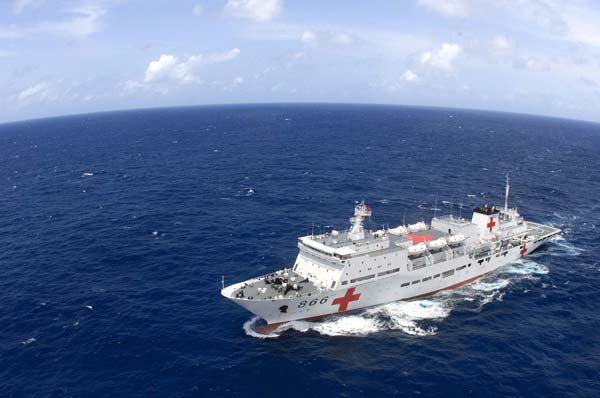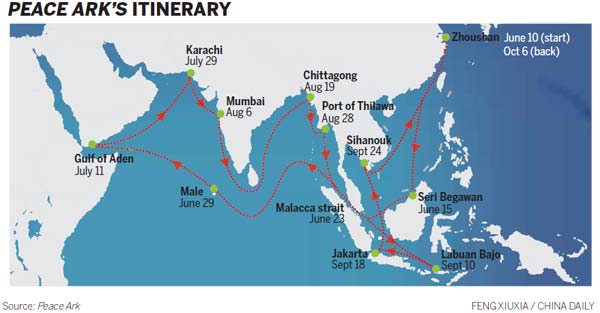 |
| Peace Ark is on a 118-day medical mission overseas. |
|
 |
"You have to know what people need in order to help them," he said. "We were warmly welcomed on the first two missions. The lines of people stretched longer than a kilometer and some even waited the entire night to see our doctor."
As the hospital ship only anchors at each stop for several days, the medical team targets common diseases and operations that can be completed quickly.
The services, including surgery and medication, are free of charge and in line with international standards, said Wang. "We have the most experienced doctors and the best medicines," he said.
Zhang Lanmei, a 50-year-old gynecologist, said this is her first Peace Ark mission.
|
Reporter's log | Peng Yining Saying goodbye to loved ones is never easy, but somehow it seems more acceptable when one is leaving on a plane or taking a train; you disappear within a few seconds, before you even remember to turn around to take one last look at your family. It's painful, but quick. However, leaving on a ship brings out the strongest grief of parting. You watch the coast slowly retreat and the ocean gradually fills one's field of vision. The process of farewell is long and drawn out - painful and seemingly endless. People standing on the quay wave, and some hold handkerchiefs. It is like a scene from an old movie where people see off a departing naval vessel, which is going into battle in strange waters and may never return. Farewell sailors! Farewell, my friends, my family, my love! You, too, wave and the tears in your eyes turn the waving handkerchiefs into blurs. Those seeing you off on the dockside have tears in their eyes as well. You can hardly see each other but the waving never stops. An officer standing on the deck next to me was waving goodbye to his wife. A soft shore breeze carried early summer drizzle and dampened his white uniform. His lips were pale and taut. His eyes tearful. This is the third overseas mission for the Chinese hospital ship Peace Ark. I joined the 118-day voyage alongside more than 400 sailors, officers and medical crew. All of them have lives back on land, but once again they have to wave goodbye to their families. For most, this is not their first departure, but the separation never gets easier. When the quay was too far away to see, everyone was still talking or texting on their mobile phones, squeezing every second before the signal disappeared. I watched my phone's signal become weaker. The voice on the other end was phasing in and out, like the fluttering of the wind, and I felt like a child who tries to catch a feather in a whirlwind. But eventually the sadness of separation abated. When every connection with the land, mobile phones and the Internet was cut off the crew began preparations for their new life on the ocean wave. The deck became a scene of cheerfulness, activity and order.
|
Purpose-built vessel
Wang said the crew includes three experts in traditional Chinese medicine, who provide treatments such as acupuncture and massage.
"Chinese medicine is widely accepted in Southern Asian countries. Our trip is also a great opportunity for people to learn more about our culture and history," said Wang. "During the visit, the ship will be totally open to local medical professionals. We are looking forward to learning from them as well."
On the walls of one sickroom, posters explain Chinese medicine and treatment. A doctor stabbed a thin needle into an officer's back to ease his backache. Through the porthole behind the doctor, seagulls could be glimpsed as they glided by. Even during heavy gales and swells, the sickrooms are quiet and dry.
"Showing goodwill to neighboring countries is a responsibility and also a sign of a confident country," said Guo from the PLA National Defense University.
He said China has a tradition of spreading friendship across the seas, referring to the voyages of Zheng He, a politician and navigator during the Ming Dynasty (1368-1644). Zheng led 100 vessels and more than 27,000 officials and soldiers on visits to more than 30 countries and regions in Southern Asia and East Africa during seven voyages in a 28-year period between 1405 and 1433. Zheng's voyages were a landmark in the history of navigation and a remarkable chapter in the diplomatic activities of ancient China.
"The Peace Ark's voyage can also be seen as a diplomatic trip, one that could help China build its international image. China and the countries the ship visits can all benefit from this trip," said Guo.
"Other nations, including the United States, also send their hospital ships overseas to provide humanitarian services."
Chen Xianguo, senior captain of the Peace Ark, described the vessel as a "lifesaving ship. Our voyage is a trip to make friends. It sends a friendly message to countries across the seas, and it's also an opportunity for them to get to know China and her navy."
Contact the writer at pengyining@chinadaily.com.cn
Ju Zhenhua, Tang Yue and Zhang Yuchen contributed to this story.
(China Daily 06/19/2013 page6)
|
|
|
|
|
|
|
|
